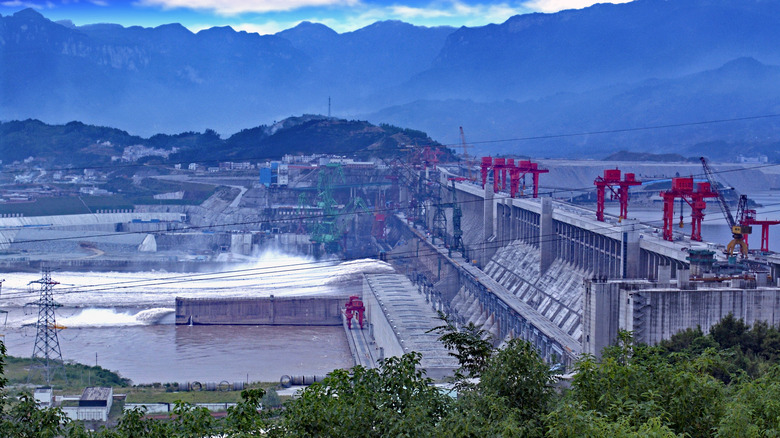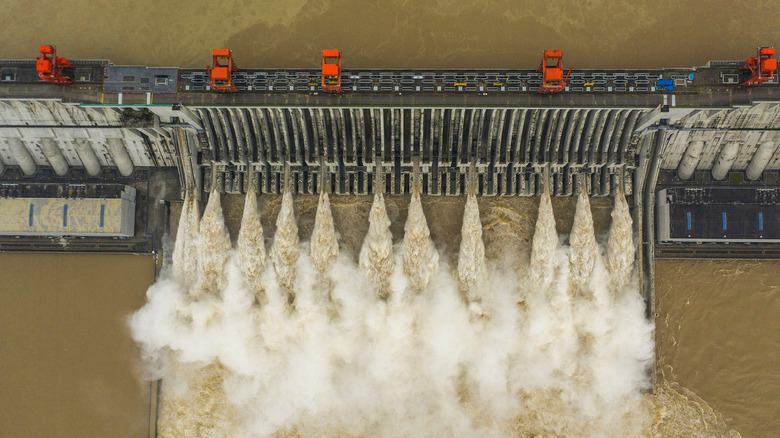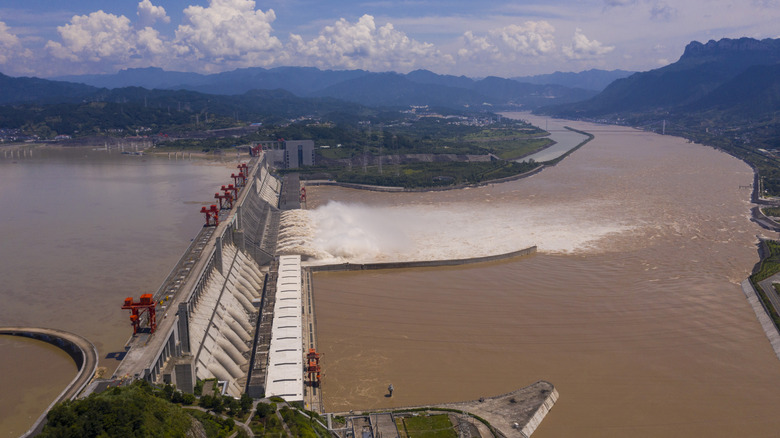Here's What Would Happen If The Three Gorges Dam Broke
Stretching for almost a mile and a half across China's Yangtze River, the Three Gorges Dam plays a vital role in the comfortable modern lifestyles many people across the globe have come to enjoy in the 21st century. You yourself most likely depend on the dam for much of the food you eat, the medicine you take, the clothes you wear, and even the technology you're using to read this article. But how is a river in China so important to people's lives on the other side of the world? Let's take a look at exactly what's going on in the Yangtze River Economic Basin and see.
According to the South China Morning Post, were the Yangtze River Basin a sovereign nation, it would have the third-largest economy in the world. It is home over 550 million people, many of whom live in the 175 cities scattered throughout the basin. When construction on the dam began in 1994, the project was hailed as a magnificent feat of engineering and a monument to national pride. However, the dam has been plagued with criticism, due to its effect on the environment, its godawful appearance on an extremely beautiful patch of earth, and its overall inability to truly control flooding the way the government promised it would. Furthermore, many fear that the dam faces structural problems that could lead to a devastating all-out collapse that would have repercussions the world over.
Rains in 2020 left the Three Gorges Dam deformed
The summer of 2020 was a record rainy season for the Yangtze River Basin. The Guardian reports that many areas of the region saw more than twice the amount of rainfall of a normal monsoon, and the pressure put a "slight deformation" into the dam. As unsettling as that sounds, the structure was declared safe by officials.
But not everyone is as convinced as the Chinese government that the dam is sound. The insightful folks over at The Prepared are keeping a keen eye on the situation and getting ready for the fallout of a worst-case-scenario collapse of the Three Gorges Dam. Their research found that a total collapse would bring around 15% of manufacturing worldwide to a complete halt. That means the supply chains for everything from food, medicine, clothing, technology, toys — basically everything on which we've grown accustomed to relying for our comfortable lives — would be disrupted. After the supply chain issues experienced due to the coronavirus pandemic, the reality of this threat has grown even more apparent.
But how, exactly, could the Chinese government undertake such a sprawling and influential megaproject without ensuring it would be safe? Wouldn't minds intelligent and creative enough to put up such a structure be prescient enough to foresee and account for the problems that lie ahead? You'd assume so. But you'd be wrong.
The Three Gorges Dam was not built to handle the storm of the century
According to CNN, the primary purpose for the dam was to control flooding, but Three Gorges is already dealing with more water than it was designed to handle, and the problem is only set to get worse. Xinhua Net reported in August 2020 that the Three Gorges Dam and others on the upper and middle Yangtze stopped the flow of more than 30 billion cubic meters of water in July 2020 alone.
In preparing for floods, dam operators can lower water levels to allow for 22 billion cubic meters of floodwaters, but this has been devastatingly insufficient in recent years. Floods in 2020 affected almost 55 million people, displacing 3.67 million and killing 158. And that's nowhere near the worst that nature can throw at the dam. Despite promises from the Chinese government that the dam would protect people from a "once in a century flood," such a storm could send as many as 244 billion cubic meters of water rushing through the river basin. Such a storm would collapse the dam, cause devastating amounts of destruction, kill tens of millions, and disrupt supply chains the world over. Unfortunately, we have no idea just how close to such a disaster we are, since information about the dam's condition is tightly controlled. So it isn't a bad idea to make a few preparations, just in case.


